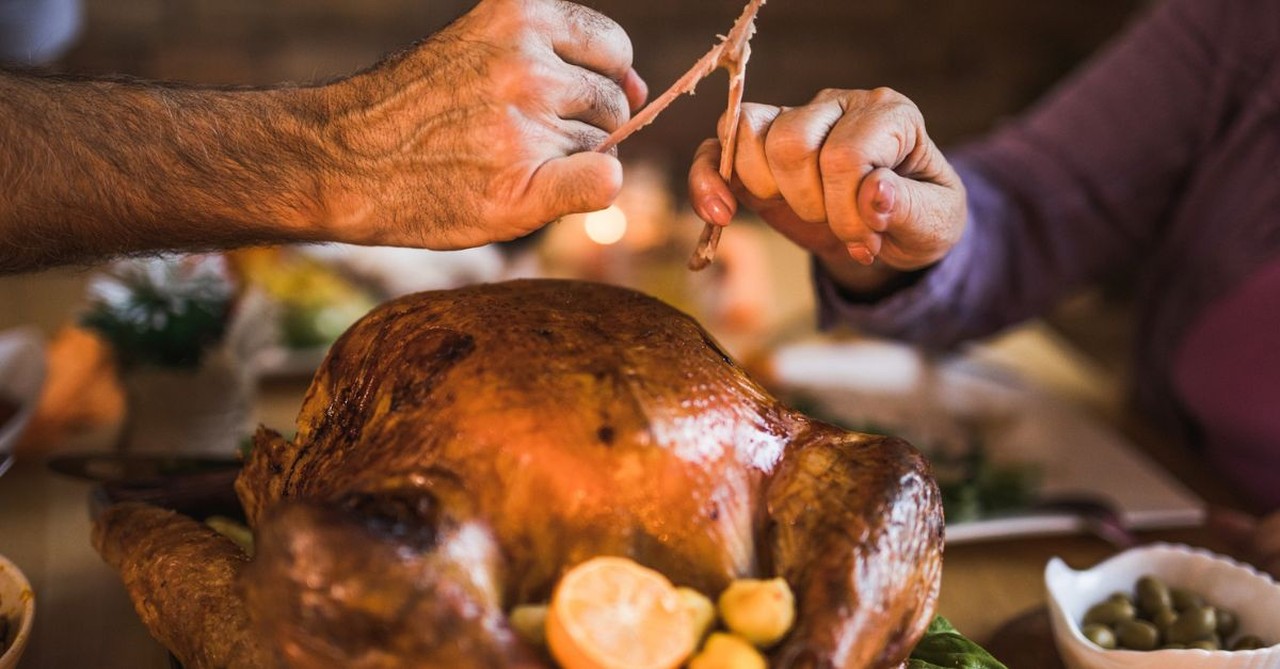6 Ways You Can Work through Grief This Thanksgiving

Holidays are often coined as the "most wonderful time of the year," however, oftentimes, for those grieving, holidays can be the hardest time of the year. Thanksgiving is a time when we should be feeling grateful, but instead, we may feel lonely if we just lost a spouse or are not up to celebrating if our loved one who made the holidays special is gone. Coming from someone who has experienced all seasons of grief, I've learned a few ways others can grieve through this Thanksgiving that won't make you miss them less but may bring a little more peace to your heart and home this holiday.
Here are 6 ways you can work through grief this Thanksgiving.
Photo Credit: ©Getty Images/Halfpoint
1. Honor Old Traditions

1. Honor Old Traditions
SLIDE 1 OF 6
The hardest part of my personal grief journey was coming face to face with the reality that my mother would not be hosting our Thanksgiving meal the year after she passed away. Even though it was hard to come to terms with the fact she would not be the one in the kitchen, my sister and I decided to host anyway, using her recipes, setting the table with her favorite fall décor, and making the day flow as it usually would.
As much as it felt like something was missing, normalizing and celebrating the traditions you shared with a lost loved one can bring comfort and make the day feel a little less lonely. Even something as simple as playing their favorite board game or baking their favorite pumpkin cookies can make their spirit live on in Thanksgivings to come.
Photo Credit: ©Getty Images/skynesher
2. Start a New Tradition

2. Start a New Tradition
SLIDE 2 OF 6
Processing grief looks different for everyone. Some may prefer to make new traditions that honor their lost loved one as an effort to move forward, and that's okay, too! There is no right or wrong way to celebrate someone dear who has passed.
Starting a new tradition, like ending the night with a family bible study using a favorite bible verse from your departed loved one is a great way to try something new while keeping that special someone in mind.
Photo Credit: ©Getty Images/Worawith Ounpeng
3. Don't Hold in Emotions

3. Don't Hold in Emotions
SLIDE 3 OF 6
On Thanksgiving morning, before the guests arrived and before the prepping madness began, I would always spend the morning watching the Macy's Thanksgiving Day Parade with my mom while devouring her homemade monkey bread. The year after she passed, I couldn't bring myself to watch the parade for fear of unlocking pent-up emotions and not being able to turn them off. Holding in my feelings only led to exhaustion by the end of the day from the constant suppression and stress on my body.
Sights, sounds, and even smells can trigger emotions, so if you feel an emotion welling up during your Thanksgiving celebration, don't be afraid to let it out. If you prefer to be in a private space, don't be ashamed of excusing yourself from the table for a moment. You'll most likely be surrounded by friends and family who love you and want to support you through your grief journey, so it's okay to show you are still processing your emotions. Keep an extra bedroom or office room open for other family members who may be grieving and need a moment alone as well.
Photo Credit: ©Getty Images/Mindful Media
4. Pray for Comfort

4. Pray for Comfort
SLIDE 4 OF 6
Unfortunately, no prayer can bring your loved one back, but remember that Jesus hears your cries and encourages you to pray to Him when seeking comfort. Two scriptures that always stick with me when I need comfort are Matthew 5:4, "Blessed are those who mourn, for they will be comforted," and Psalm 34:18, "The Lord is close to the brokenhearted; he rescues those whose spirits are crushed."
The evening before Thanksgiving and the morning of, meditate over these verses and pray to Jesus, asking him to bring peace to your mind and comfort in knowing he is with you throughout this season.
Related Article: 10 Prayers for Comfort for People Feeling Loneliness Around the Holidays
Photo Credit: ©Pexels/Matheus Bertelli
5. Seek Support

5. Seek Support
SLIDE 5 OF 6
Talking about what you're thankful for can be extra challenging when you're hurting so badly over losing somebody. If you are anything like me, you may naturally find it hard to be vulnerable around family members in fear of "bringing down the mood" when there's been a happy streak. There's nothing wrong with not wanting to bring up a loss, but bottling up these emotions can only lead to moodiness and feelings of being overwhelmed.
The good news – there are ways to seek support outside of your family and friends who you may not want to confide in. Support groups like GriefShare allow you to walk through seasons of grief with a group, which, to some, may be intimidating. Think of it like this – too much silence can lead to suffering alone when, in reality, many others are suffering in the same way. It only makes sense to walk through it together rather than pretend like you are not walking through it at all.
GriefShare also offers a two-hour holiday-focused series called Surviving the Holidays, which helps prepare grieving individuals for the holiday season without their loved ones and offers tips for coping. To learn more and find an event near you, click here.
Photo Credit: ©Getty Images/andreswd
6. Create a Holiday Grief Journal

6. Create a Holiday Grief Journal
SLIDE 6 OF 6
There are many coping techniques for grieving, but a personal favorite is journaling. Something I've encountered through taking grief courses and research is the common theme of chaotic emotions that come with grief. One instructor described grieving emotions as a giant rubber band ball mixed with multi-colored bands. Each day, a different "rubber band," aka an emotion, is pulled out of the mix. Sometimes, it's the same emotion two days in a row, and others, emotions can switch from happy to angry in just 24 hours.
Making sense of how you are feeling is much easier when you take the time to organize your thoughts and write them down on paper. With the holiday season keeping everyone busier than normal, scheduling a set time to journal daily can help you become aware of your emotions, allow you to express whatever is on your mind that day, and reflect back on your grief journey as time progresses. This will make future holidays easier as you physically see your progression.
I personally found that writing at night was the most helpful because it allowed me to vent out all the thoughts I may have been holding in throughout the day. For grievers who may struggle with a racing mind at night or insomnia, adding this habit to your schedule through the holiday season may help you find more restful nights of sleep.
Photo Credit: ©Getty Images/FreshSplash
Related Article: 5 Ways You Can Support Those Who Are Grieving This Thanksgiving
Originally published November 27, 2025.






